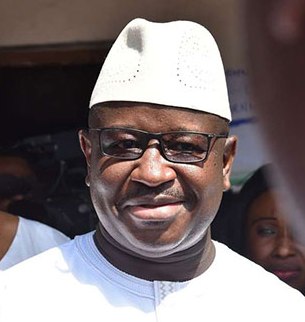Using a ‘National Conversation’ approach to review the Constitution
Eighty Sierra Leoneans I heard have had a national call. They have been asked to lead a process on the review of the country’s national constitution. The current constitution which came into force in 1991 may be utilising and enjoying its last supreme powers. The members of the Constitutional Review Committee, according to President Ernest Bai Koroma’s statement at the launch of the Committee on 30th July, 2013, are to pay attention to a number of issues that have arisen relating to certain sections and provisions of the constitution since its enactment in 1991. The guardian of the Constitution said “I urge this committee to pay attention to these sections.” He also said that “We must act to remove constitutional ambiguities, ensure greater clarity of our statutes; and rationalize our governance processes.” The president’s statement sounded like a whistle that has been blown to signal the start of a match. Is it a match between the committee members and the rest of us they are supposed to consult?
Interestingly, the committee was set up at a time some people had predicted the outcome of a process that was yet to see the light of day. Some believe in it, others do not. Some see it as a unique opportunity to rewrite our constitution to meet present day realities. Others believe the ruling government has ulterior motives, among them, an extension of the tenure of office of the president. This is Sierra Leone. These are the typical views of most present day Sierra Leoneans. The views are more often than not- green versus red. But the question that comes to mind at present is how should Sierra Leoneans view this process?
The constitutional review demands the utmost commitment and seriousness of all Sierra Leoneans. It should not be seen as a ‘feel good factor.’ The reasons for the above assertion are compelling. For example, Article 10 of the Lome Peace Act of 1999 titled “Review of the Present Constitution” provides that “In order to ensure that the Constitution of Sierra Leone represents the needs and aspirations of the people of Sierra Leone and that no Constitutional or any Legal provision prevents the implementation of the present agreement, the Government of Sierra Leone shall take the necessary steps to establish Constitutional Review Committee to review provisions of the present Constitution and where deemed appropriate recommend revisions and amendments, in accordance with Part 5, Section 108 of the Constitution of 1991.” Furthermore, the Truth and Reconciliation Commission and the Sierra Leone Conference on Development and Transformation (where I served as a researcher) also recommended the review of our constitution. The review in my view signals the government’s commitment to implementing a recommendation made as far back as 1999. I know some opposition politicians believe the ruling government wants to use the review to extend the second term of office of the president (by the way Section 46 (1) of the current Constitution of Sierra Leone, Act No. 6 of 1991 under which the President was elected is clear on this), but the Office of the President has ruled out such insinuation. As opposed to being a process that promotes the interest of any particular group or party, I argue that the review should be a by-product of a ‘national conversation.’
A national conversation I believe is the answer to providing a constitution that will have a national outlook. This approach will not be new to Sierra Leone. The Scottish government used it in 2007 when it engaged in public consultation exercises on its possible future changes in the power of the devolved Scottish parliament and the possibility of Scottish Independence. The government dubbed that process as the ‘National Conversation.’ In that conversation, comments were encouraged from members of the public, rather than just interest groups. In Singapore for example, Prime Minister Lee Hsien Loong during his 2012 National Day Message announced the Singapore Conversation which was a national conversation on creating “a home with hope and heart.” The committee dialogue sessions included “taxi drivers, professionals, full-time national servicemen, university undergraduates and retirees.”
If the national conversation approach is to be used during the review, it presupposes that the platform should be created. At least on paper, President Koroma at the launch disclosed that “This is a committee constituted from people of every region, political affiliation and socio-economic group to perform a sacred task.” The president further notes that “We trust that this committee will not seek to impose its opinion on the people. We expect this Constitutional Review Committee to host public consultations in ways that allow every citizen to make a contribution. These consultations must not be centered within one specific area or region, but should span the length and breadth of Sierra Leone. The Committee should also take advantage of other technological developments and receive submissions electronically to encourage the widest possible public participation.” This is the point. It makes no sense to have a review if the people were not going to own the process.
I have no intention to doubt the sincerity of members of the committee to heed the president’s trust in them holding public consultations that will allow citizens contributions. However, in the event some people choose to hijack the process, I urge all of us Sierra Leoneans to demand and take full ownership of the process. I know the attitude of many Sierra Leoneans is to quickly ‘give up’ and allow people to possess that which belongs to all of us. The President himself said at the launch that “We also urge all Sierra Leoneans, from every region, every district, ethnic group, and political and religious affiliation to support the process, fully participate in it, and take ownership of the review. This is the best way to make the resulting document a true covenant amongst all of us to honor our common aspirations. Good constitutions are not imposed.”
The Diffusion Theory is apt in making the “resulting document a true covenant amongst all of us to honour our common aspirations.” The theory is another way to look at how people process and accept information. Diffusion theory says that people adopt an idea only after going through the following five discrete steps or stages, ‘Awareness (the individual has to have been exposed to the idea), Interest (The idea has to arouse the individual), Evaluation (The individual must consider the idea as potentially useful), Trial (The individual tries out the idea on others) and Adoption (This represents final acceptance of the idea after having successfully passed through the four earlier stages) (Lattimore et al (2004), Public Relations-The Profession and the Practice). It is critical to understand and to use this theory in this review because according to Lattimore et al, “This theory is useful for explaining how we reach important decisions— not acts of impulse.” The mass media is important in using this model. The committee must make people become aware of the process, arouse their interest; get feedback on how they evaluate the process, how they have tried the ideas with others, and what they think should be adopted. I believe, this is where the work of the Sierra Leone Association of Journalists (SLAJ) comes in as a member of the committee. Like our SLAJ president, Kelvin Lewis rightly put it during a programme on a local radio station, providing education and reportage on this process is the job of media practitioners and not civil society organisations or non-governmental organisations. I know some people will definitely want to frustrate particularly media practitioners from not taking part in the process or being at the periphery, but we must not allow them to succeed. We should be resolute to make our presence felt by our distinguished nominee who will represent us at the committee.
We must not allow few people to impose their ideas on us, if they decide to do so anyway. This constitutional review should not be seen as a contest between ’red and green.’ I will re-echo a point I made during a programme in one of the local radio stations that many Sierra Leoneans have deliberately chosen to view everything and anything that comes on the platform for national discourse from either the red or green perspective. Those of us who are journalists and analysts will write and speak on this issue. The process has begun. The result will soon be here. Will it be a reflection of our thoughts and aspirations as a country, let’s wait and see. In the meantime, let’s demand and depend on our strength as a people giving legitimacy to those who govern us, in making our case during the entire constitutional review process.
By: Francis Sowa
Francis Sowa is a journalist/social and media analyst and lecturer, Mass Communication Department, Fourah Bay College, University of Sierra Leone (fsowa2007@yahoo.com, +232 76 866 519/ +232 77 866 569)
Stay with Sierra Express Media, for your trusted place in news!
© 2013, https:. All rights reserved.





